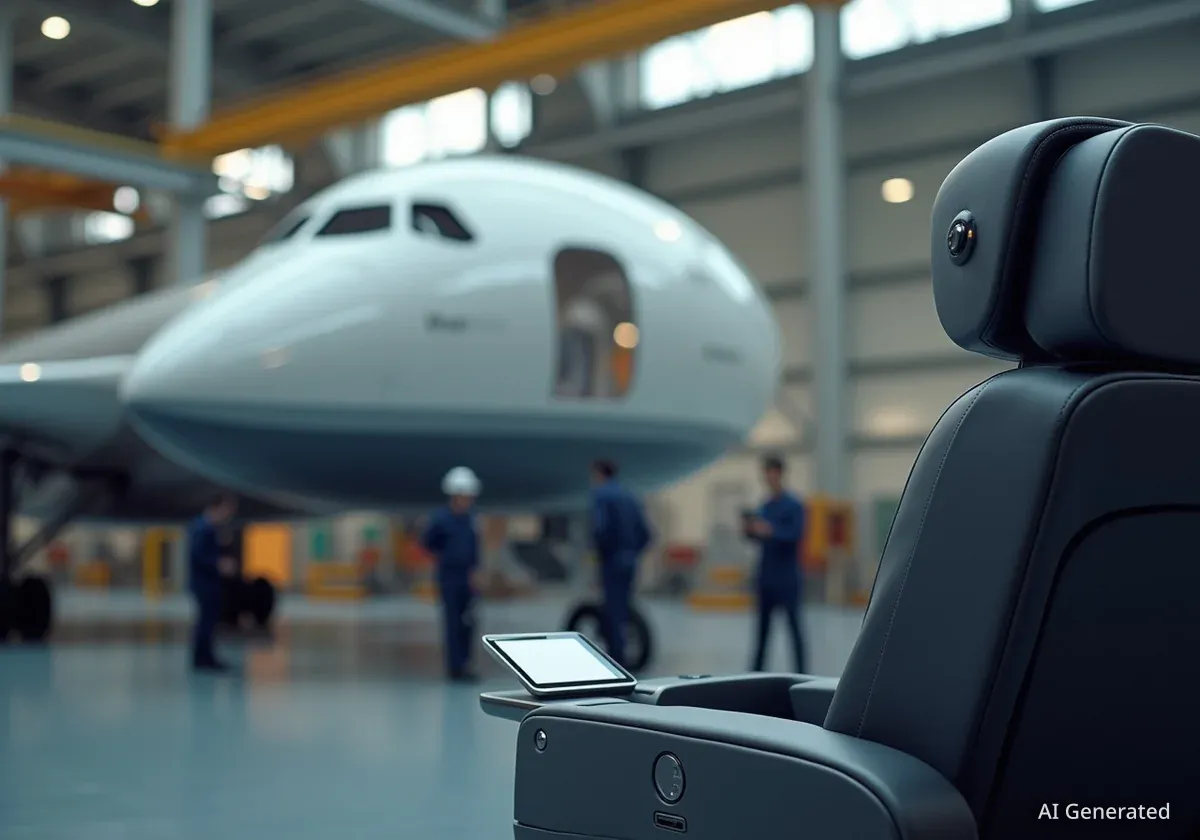United Airlines has announced a significant investment in its future fleet, placing a firm order for 150 new aircraft from Boeing and Airbus. The multi-billion dollar deal includes 100 Boeing 787 Dreamliners and 50 Airbus A321neo jets, aimed at modernizing its long-haul and domestic premium routes. The airline also unveiled a new international business class suite, named 'Polaris Ascent'.
This strategic move is designed to replace older, less efficient aircraft, reduce carbon emissions, and enhance the passenger experience. Deliveries of the new aircraft are scheduled to begin in 2026, with the cabin retrofits starting on the existing fleet in late 2025.
Key Takeaways
- Major Aircraft Order: United Airlines has ordered 100 Boeing 787 Dreamliners and 50 Airbus A321neo aircraft.
- New Business Class: The airline introduced the 'Polaris Ascent' suite, featuring privacy doors and advanced technology.
- Fleet Modernization: The new jets will replace older Boeing 767 and 757 models, improving fuel efficiency.
- Delivery Timeline: New aircraft deliveries are set to start in 2026, with cabin retrofits beginning in late 2025.
A Detailed Look at the Aircraft Purchase
The aircraft order is split between two of the world's largest manufacturers, reflecting a strategy to diversify its fleet capabilities. The centerpiece of the deal is the order for 100 Boeing 787 Dreamliners, with options for an additional 50. This marks one of the largest single orders for widebody aircraft in recent years.
United will use the fuel-efficient 787s to replace its aging Boeing 767 and some older 777 aircraft. This will allow the airline to expand its international route network while significantly lowering operational costs and fuel consumption. According to industry data, the 787 Dreamliner is up to 25% more fuel-efficient than the aircraft it will replace.
The second part of the order consists of 50 Airbus A321neo aircraft. These single-aisle jets are intended for premium domestic transcontinental routes, such as New York to Los Angeles, and select shorter transatlantic flights. The A321neo is known for its range and efficiency, enabling airlines to offer a widebody-style service on narrowbody planes.
Introducing the 'Polaris Ascent' Business Class
In conjunction with the fleet announcement, United unveiled its next-generation international business class product, 'Polaris Ascent'. This new suite represents a major upgrade to its premium cabin offering and is designed to compete with the top products from global carriers.
The airline stated that the design was developed over two years, incorporating extensive customer feedback. The goal was to create a private, comfortable, and technologically advanced space for long-haul travelers.
Key Features of the New Suite
The 'Polaris Ascent' cabin will be configured in a 1-2-1 layout, ensuring direct aisle access for every passenger. Notable features include:
- Full-Privacy Doors: A sliding door at each suite will offer enhanced privacy.
- Advanced Entertainment: A 22-inch 4K screen with Bluetooth audio connectivity.
- Wireless Charging: A dedicated surface for wireless charging of personal devices.
- Ample Storage: Multiple enclosed storage compartments for personal belongings.
- Upgraded Bedding: Continued partnership with Saks Fifth Avenue for premium bedding.
United CEO Scott Kirby commented on the investment in a company press release.
"This order is a testament to our confidence in the future of air travel. By investing in these new aircraft and our revolutionary Polaris Ascent cabin, we are not just growing our fleet; we are elevating the entire customer experience and setting a new standard for comfort and quality."
Fleet Modernization and Sustainability Goals
This aircraft order is a cornerstone of United's broader fleet modernization and sustainability strategy. The airline aims to significantly reduce its carbon footprint over the next decade. The new Boeing and Airbus jets are central to achieving this goal.
Efficiency by the Numbers
According to the manufacturers, the new-generation aircraft offer substantial environmental benefits. The Boeing 787 Dreamliner and Airbus A321neo are approximately 25% more fuel-efficient per seat and produce 25% fewer CO2 emissions compared to the previous-generation aircraft they will replace. They also have a nearly 50% smaller noise footprint.
By retiring older, four-engine and twin-engine widebodies, United will simplify its fleet, reduce maintenance costs, and improve operational reliability. The airline projects that by 2030, the average age of its widebody fleet will drop from 16 years to under 10 years, making it one of the youngest among major U.S. carriers.
"Our 'United Next' plan is about more than just buying new planes," said Andrew Nocella, United’s Chief Commercial Officer. "It's a comprehensive strategy to create a more reliable, efficient, and customer-focused airline. These aircraft are the right tools to build the future of United."
Market Impact and Competitive Response
United's major fleet investment is expected to increase pressure on its main rivals, Delta Air Lines and American Airlines. While all major U.S. carriers are in the process of modernizing their fleets, the scale of this order and the simultaneous cabin upgrade signal United's aggressive push to capture a larger share of the lucrative premium travel market.
The Premium Cabin Arms Race
In recent years, major airlines have been intensely focused on their business class offerings. Delta's 'Delta One Suites' with closing doors set a new standard for U.S. carriers in 2017. American Airlines followed with its 'Flagship Suite' on new Boeing 787-9 and Airbus A321XLR aircraft. United's 'Polaris Ascent' is a direct response, aiming to leapfrog the competition with larger screens and more advanced features.
Industry analysts note that the timing of the order allows United to secure production slots with Boeing and Airbus at a time when demand for new, efficient aircraft is high. This proactive fleet management could provide a competitive advantage in the latter half of the decade.
The introduction of the Polaris Ascent suite will begin with retrofits on existing Boeing 787 and 777 aircraft in late 2025. The first new aircraft factory-delivered with the new cabins are expected to enter service in mid-2026. The complete rollout across United's international widebody fleet is anticipated to be finished by 2029.





